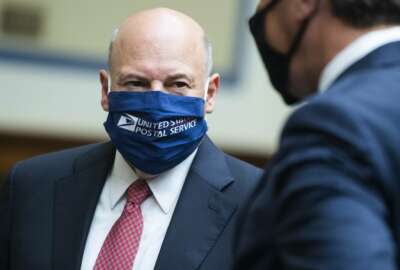

The Postal Service is one step away from having its first fully staffed Board of Governors in years, now that the Senate Homeland Security and Governmental Affairs...
The Postal Service is one step away from having its first fully staffed Board of Governors in years, now that the Senate Homeland Security and Governmental Affairs Committee has approved President Joe Biden’s three nominees to serve on the board.
The three nominees, if confirmed by the full Senate, would help USPS move ahead with the 10-year reform plan it released last month. The nominees, in a committee hearing last week, praised key features of the plan, while expressing wariness about elements of the plan that could hurt delivery standards.
Their confirmation would also overturn a Republican majority on the board. The nominees, however, told HSGAC members that no one in the Biden administration sought a commitment to fire Postmaster General Louis DeJoy or discussed his performance.
The nominees are Ron Stroman, the former deputy postmaster general; Anton Hajjar, a former attorney for the American Postal Workers Union; and Amber McReynolds, the former director of elections in Denver and the chief executive of the nonprofit National Vote at Home Institute.
Several Republican committee members voted against all three nominees. Sen. Ron Johnson (R-Wis.) voted against full terms for all three nominees, but voted in favor of a partial term for Stroman that would end this December.
Johnson said he voted against full terms for the nominees because the Biden administration didn’t submit a slate of bipartisan picks. Stroman and Hajjar are both registered Democrats, and McReynolds is a registered independent.
“It’s not really an indication on the individuals, it’s just we shouldn’t be doing a completely partisan slate of three” governors, Johnson said.
All three nominees told the committee in their confirmation hearing last week they’re committed to keeping USPS self-funded and self-sufficient. Stroman, however, said USPS must work with Congress to pass legislation that would eliminate its 2006 mandate to pre-fund retiree health benefits well into the future.
“Ultimately, part of the financial stability of the Postal Service rests in Congress’s passing postal reform. And in order for that to happen, Congress needs to understand and communicate clearly with the Postal Service,” Stroman said.
Hajjar said the USPS must focus on addressing “unacceptable” deteriorations in mail delivery, which he said the 10-year plan addresses. He did, however, criticize some elements of the plan.
“It’s right there in the Postmaster General’s 10-year plan, that he wants to bring back the confidence of the American people in the Postal Service. I think that has to be the first priority. A lot of important aspects of the 10-year plan — some of them are slightly conflicting,” Hajjar said. “The number-one thing, I think, is to restore service so that people do not have their confidence shaken in the ability of the Postal Service to deliver effective, timely, reliable service.”
As for other elements of the plan, such as an ongoing consolidation of mail processing facilities, Hajjar said those changes have not gone well in the past.
“We know from the last round of consolidations that service plummeted, and we’re still suffering with the deterioration of service that came from that. So that has to be taken into account when offices are consolidating. The communities have to be consulted specifically, and those views have to be taken into account,” Hajjar said.
McReynolds said her top priority, if confirmed, would be ensuring USPS upholds its obligation to provide “prompt, reliable and equitable service” throughout the country, particularly in rural communities.
“Rural communities are essential in terms of any changes that get put forward with the network or even service. And we have to maintain it, and we have to maintain the universal service obligation that is outlined clearly in the law. And it’s important, I also believe, to engage rural stakeholders directly on what is important to them, what they need, what they don’t have access to now, and look for opportunities that are creative and innovative, to better serve them,” McReynolds said.
Stroman also praised the 10-year plan’s focus on putting more non-career USPS employees on a career track, which he said would decrease turnover and provide a more reliable headcount of workers.
“Non-career employees save you some money, but they do hurt you on the service side, because the turnover there is very high,” he said.
USPS hired 200,000 temporary workers during its peak holiday season late last year, but DeJoy said last month that those hires never moved the needle on the agency’s overall headcount. USPS over the past year has also dealt with a critical shortage of employees because of the COVID-19 pandemic.
The nominees also expressed a commitment to grow revenue and explore new lines of business at a time when total mail volume is down more than 23% over the past decade.
Stroman proposed USPS work with the Small Business Administration to better tailor its mail and package services to small businesses.
“This is particularly important coming out of the pandemic. And I think if the Postal Service can strengthen its IT infrastructure, it provides just a tremendous opportunity to be able to improve its relationship with small businesses and help grow the business,” he said.
Hajjar also highlighted the plan’s focus on building up its package business and offering additional government services — such as passport services and identity proofing — to increase traffic to post offices.
“That is hopeful. It’s complicated. It may require a whole different network to perform it. But that’s one thing,” Hajjar said about the agency’s package business. “Providing services in post offices where there is a need is also a helpful way to capitalize on the networks that exist in the Postal Service.”
Copyright © 2025 Federal News Network. All rights reserved. This website is not intended for users located within the European Economic Area.
Jory Heckman is a reporter at Federal News Network covering U.S. Postal Service, IRS, big data and technology issues.
Follow @jheckmanWFED



